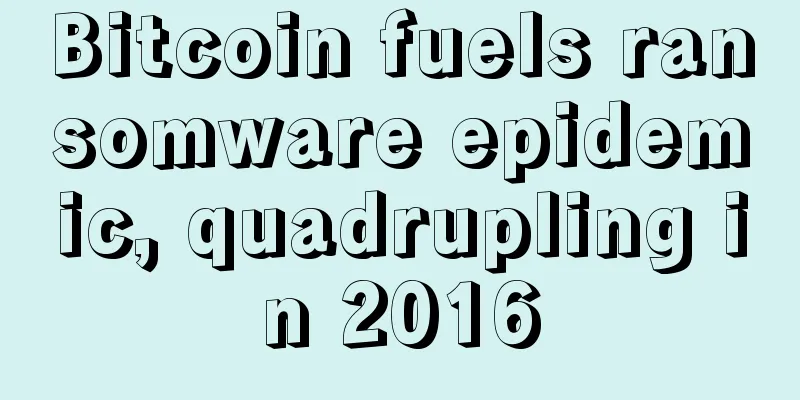Bitcoin fuels ransomware epidemic, quadrupling in 2016

|
One night in April, Dave Winston, a member of the racing team , went to a convenience store and stuffed $20 bills into the ATM. He wanted to buy something he had heard about just a few hours ago. The computer files in his office were encrypted and locked by hackers. He had to buy Bitcoin equivalent to $500 to pay the ransom, which would of course affect the next race he would participate in. Things like what happened to Winston are becoming more and more common. He was infected with ransomware. Hackers break into computer systems and encrypt all the files in the computer. Some hackers even post the files online if they see that the victim has no intention of redeeming the files. To get the files back, one can only follow the instructions and pay the money. Although ransomware has been around since the 1980s, it is only recently that technological advances have led to an increase in the number of victims of ransomware this year. The invention of Bitcoin and improved encryption software have made ransomware a low-cost and low-risk crime compared to other crimes such as credit card fraud. Ransomware encrypts the victim's files and spreadsheets, making them completely unreadable. Hackers often target computers in hospitals, enterprises and university networks, especially hospitals with low levels of information technology, which often become hackers' favorite attack sites. According to Cyence data, the average ransom for each case is $500 to $1,000. By 2016, the number of cases had quadrupled. Today, there are as many as 4,000 cases per day in the United States, forcing the U.S. federal government to jointly compile a manual to teach basic information security protection measures. Mr. Winston did not know how the ransomware got on his computer, but security experts pointed out that ransomware often appears as a link or attachment in an email, tricking users into clicking or executing it, and then quietly installing it on the victim's computer. Since computers have become a common tool in offices, not every computer is well protected, and not every employee is so alert, hackers have more opportunities to make a lot of money, and have many opportunities to invade the system and infect all computers connected to the system. Although law enforcement agencies generally do not encourage compromise with criminals, FBI personnel admitted at a security summit that victims may have to follow the criminals' instructions and pay the money. In the federal government manual mentioned earlier, it is mentioned that there are still risks after paying the money, such as hackers wanting more ransom, and they will only give the decryption key after paying a second ransom. Winston's team was about to participate in a big race, and the locked files were mostly blueprints for the control of the car in different situations, such as how to adjust the springs, shock absorbers and steering wheels, which were very important for the performance of the racer. When he bought $500 worth of Bitcoin and transferred it to the hacker, the hacker did not ask for more ransom again. Winston received the decryption key and successfully unlocked the files in his computer. The big stone in his heart was finally put down, and the team successfully finished the race. |
<<: Andreas Antonopoulos: How Bitcoin makes us as powerful as banks
Recommend
Is it good for a man to have a thick beard?
Different physical features represent different m...
Principled Thoughts on Bitcoin Scaling
This article is an article published by Wu Gang, ...
ChainNode live broadcast room, revealing Avalon's most powerful mining machine A1166, is it a mining machine or a money printing machine?
Bitcoin computing power has reached 100E, and the...
Huobi formally sued a self-media and its actual operator Liu Fuwei
On November 30, according to Huobi news, Huobi ha...
What to do if your lifeline is short
Palmistry is an important branch of physiognomy. ...
Is it good for a woman to have a mole on her face?
When it comes to moles on the face, the main thin...
The UK Treasury is seeking opinions on issues related to "cryptocurrencies and stablecoins"
According to BlockBeats, the UK Treasury is publi...
Can the Bitcoin Rune Fever Last?
Runes, a new protocol for minting fungible tokens...
Moles on the ears. Physiognomy. Moles on the ears. Is it good or bad to have moles on the ears?
Moles on the ears, is it good or bad to have mole...
Inventory of 6 innovative projects based on zkSync
The zkSync ecosystem is poised for explosive grow...
Fortune from the forehead
In physiognomy, the forehead is the location of t...
Which four types of palm lines have good fortune for women?
In addition to being able to see a person's f...
Men with phoenix eyes are stable and upright
In fact, in real life, many people don’t particul...
What is the special meaning of moles on the inner arm?
What is the special meaning of moles on the inner...
The facial features of no luck and no fortune
The facial features of no luck and no fortune A p...









